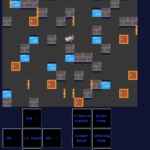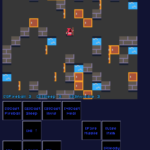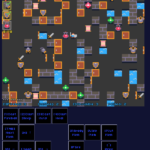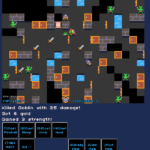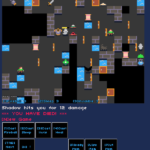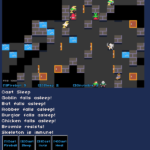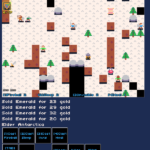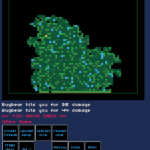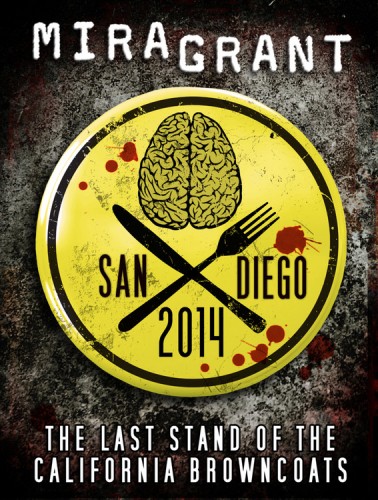Well, I'm exhausted, but I have a working #7DRL shipped. I may come back tonight and do some more, otherwise a post-7DRL update will fix the missing bits.
- PortalWorlds on itch.io
- 7DRL submission: Rate my submission!
Play, and if you liked it, shower me in gold, or at least rattle some change at my tip jar. If you have other feedback, comment but be kind, I'm so very tired.
Archive of my dev diary/comments:
- Day 1 (Sun, 2020-03-01)
Getting started now. Will be working until next Saturday!
Tiling, basic animation, and keyboard input.
Minor annoyance, discovered Oryx’s “wee fantasy” figures, which are otherwise quite excellent, are left-handed. Flipping the images gets them all fixed except right-facing still has a shield in left hand. I don’t mind a few sinister figures, but that’s too much to ask of heroes not named “Link”.
Basic random character and stat display.
-
Day 2 (Mon, 2020-03-02)
Didn’t get a lot of uninterrupted time today, but made useful progress finally:
Items now exist, can now be got (auto when you move; I might add a Get command), put down, readied/removed, and used.
-
Day 3 (Tues, 2020-03-03)
Very productive day. Mana recovery, added a Get command, visibility calculations so walls occlude vision.
Changed the way I write objects and monsters to use prototype objects (an object system on top of an object system, but it’s more convenient).
Monsters (well, just Goblins today) are placed and can be fought. They don’t move yet.
-
Day 4 (Wed, 2020-03-04)
Very little free time today, but I got a monster list completed, with a lot of tricky multi-level monsters, and I can spray them all over the junk level. Got some design notes for spells and missiles, and how I’ll split up the levels tomorrow. Then try some kind of AI once I have a place to navigate.
-
Day 5 (Thur, 2020-03-05)
Floating damage numbers & effects. Basic mob AI, no pathfinding yet. Sleep, Invisible, Heal spells.
Running low on time, so much stuff left to do and I just did some detail work today, didn’t even get missiles in (and Fireballs, which are a slow case of missiles that explode). Levels, absolutely first thing tomorrow.
-
Day 6 (Fri, 2020-03-06)
DON’T PANIC. Well, panic a little. Got door opening (but not closing, needs a whole new command), Portals (AT LAST), and 6 level generators + tutorial level. They’re very simplistic levels, and it’s possible to be trapped in some, but usually works?
Tomorrow I should really get missiles flying, trapped levels, maybe an overview map are optional. Strength/“experience” gain is a little harsh right now, but balance is low on my priorities.
Found an absolutely horrible off-by-1 math bug in a library I’ve been using for years. Programming: It’s always harder than you think.
-
Day 7 (Sat, 2020-03-07)
Exhausted, I don’t ever work this many days in a row anymore. So I got the overview map done, and rebalanced it a bit more sanely. It is playable and a fun challenge until you get curb-stomped by wights or stuck in a dead-end world.
I have until tonight (Saturday) at midnight, so if I feel up to it later I’ll get to some of my TODO list.
Playable version is up now, let me know what you think!
-
Day 7, Later
Got back to adding missiles and fireballs! Done! Ship it!
(Levels still kind of suck, I’ll improve those later. But the gameplay should be finished.)
